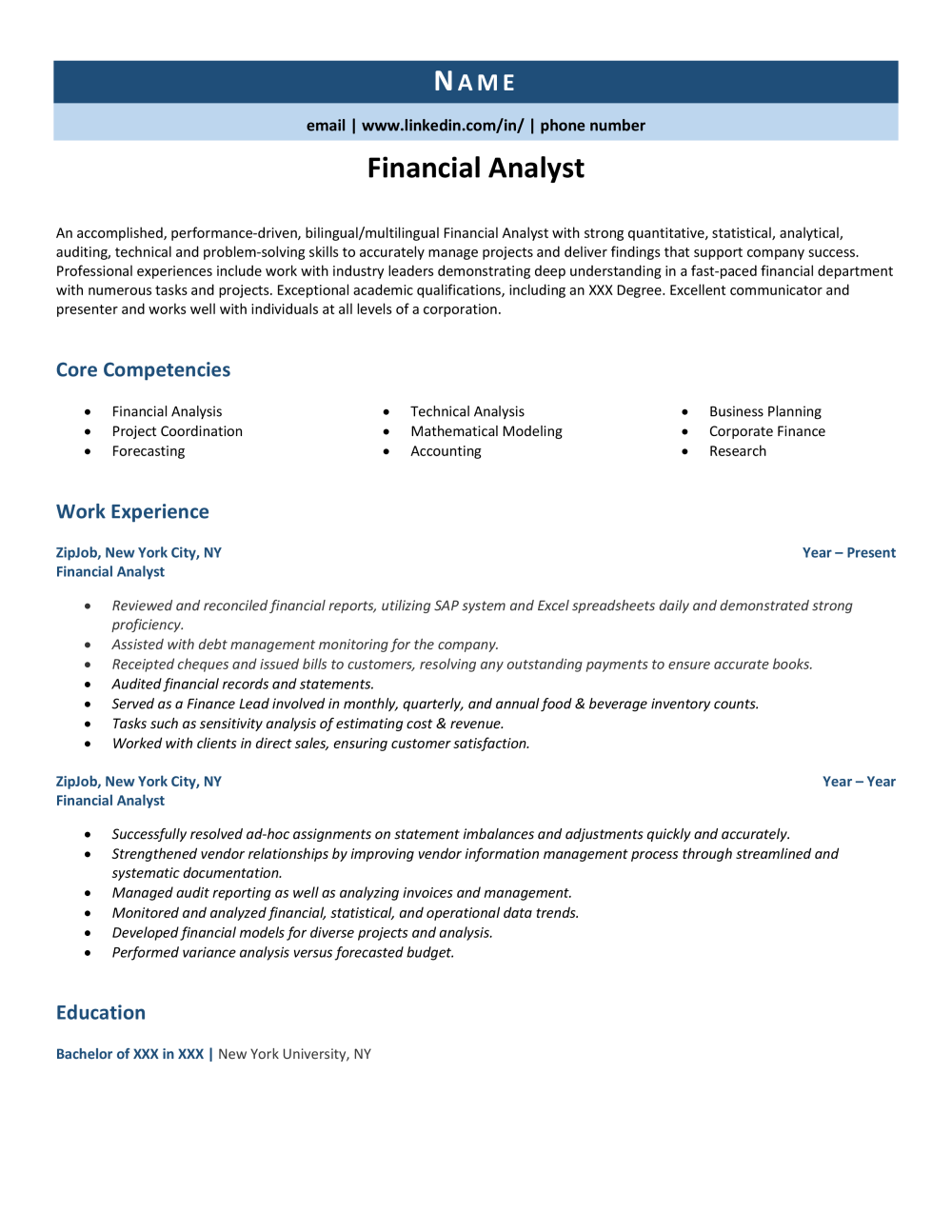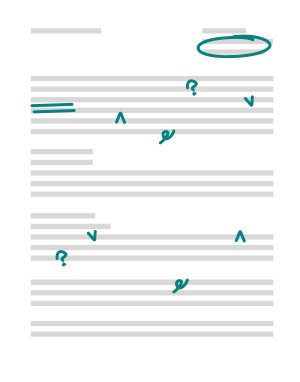Financial Analyst Sample
Download and customize our resume template to land more interviews. Review our writing tips to learn everything you need to know for putting together the perfect resume.
A Financial Analyst analyzes a company's financials to identify areas of opportunity and concern and trends. Below is a general Financial Analyst job description: Corporations and businesses typically have a responsibility to shareholders and owners to use earned income in a way that builds company wealth. A financial analyst carefully studies marketplace trends, demographics and microeconomic factors to help the company make smart investments. The financial analyst may also provide advice to companies on issuing their own bonds, splitting stock and other areas of concern. Payscale
Expert Tip
You should never use a creative resume
Many job seekers think that an eye-catching resume template will help them stand out to hiring managers and increase their chances of landing an interview. This is a myth put out by resume builders that value design over content.
The truth is that most hiring managers prefer a traditional resume format.
Creative resume templates, like the one pictured here, can actually hurt your chances of landing an interview. Instead, you should use a basic resume format that quickly communicates your basic information and qualifications–like the one included below.
Financial Analyst resume (text format)
How confident are you feeling about your resume? If you need more help, you can always refer to the following resume sample for a position.
Name
Title
City, State or Country if international
Phone | Email
LinkedIn URL
FINANCIAL ANALYST PROFESSIONAL
An accomplished, performance-driven, bilingual/multilingual Financial Analyst with strong quantitative, statistical, analytical, auditing, technical and problem-solving skills to accurately manage projects and deliver findings that support company success. Professional experiences include work with industry leaders demonstrating deep understanding in a fast-paced financial department with numerous tasks and projects. Exceptional academic qualifications, including an XXX Degree. Excellent communicator and presenter and works well with individuals at all levels of a corporation.
CORE COMPETENCIES
Financial Analysis
Project Coordination
Forecasting
Technical Analysis
Mathematical Modeling
Accounting
Business Planning
Corporate Finance
Research
PROFESSIONAL EXPERIENCE
Financial Analyst
ZipJob, New York NY | Year to Year
Responsibilities
Reviewed and reconciled financial reports, utilizing SAP system and Excel spreadsheets daily and demonstrated strong proficiency.
Assisted with debt management monitoring for the company.
Receipted cheques and issued bills to customers, resolving any outstanding payments to ensure accurate books.
Audited financial records and statements.
Served as a Finance Lead involved in monthly, quarterly, and annual food & beverage inventory counts.
Tasks such as sensitivity analysis of estimating cost & revenue.
Worked with clients in direct sales, ensuring customer satisfaction.
Financial Analyst
ZipJob, New York NY | Year to Year
Responsibilities
Successfully resolved ad-hoc assignments on statement imbalances and adjustments quickly and accurately.
Strengthened vendor relationships by improving vendor information management process through streamlined and systematic documentation.
Managed audit reporting as well as analyzing invoices and management.
Monitored and analyzed financial, statistical, and operational data trends.
Developed financial models for diverse projects and analysis.
Performed variance analysis versus forecasted budget
EDUCATION
Complete School Name, City, St/Country: List Graduation Years If Within the Last Ten Years
Complete Degree Name (Candidate) – Major (GPA: List if over 3.3)
Relevant Coursework: List coursework taken (even include those you are planning on taking)
Awards/Honors: List any awards, honors or big achievements
Clubs/Activities: List clubs and activities in which you participated
Relevant Projects: List 2-3 projects you have worked on
Everything you need to write your financial analyst resume
Now that you’ve seen an example of a job winning Financial Analyst resume, here are some tips to help you write your own. You should always begin with a summary section. Remember to use basic formatting with clear section headings and a traditional layout. Finally, be sure to include top skills throughout your resume. We’ve included several examples common for Financial Analyst below.
Let’s start with your resume summary section.
1. Summary
The resume summary replaces the out-of-date resume objective. A summary outlines the most impressive parts of your resume for easy recall by your potential employer, while also serving to fill in personal qualities that may not appear elsewhere on the page. Remember that summaries are short and consist of pithy sentence fragments! You can check out the Financial Analyst resume example for more information!
Expert Tip
Always start with your most recent positions at the top of your resume. This is called reverse-chronological format, and keeps your most relevant information easy for hiring managers to review.
2. Formatting
Our experts recommend you start your resume with a resume summary, like the one above. Other common sections are Work Experience, Education, and either Skills or Core Competencies. Here are some guides from our blog to help you write these sections:
Some resumes will include other sections, such as Volunteer Experience or Technical Skills. When it comes to what sections you need to include on your resume, you will know best!
Other sections for you to consider including are foreign language skills, awards and honors, certifications, and speaking engagements. These could all be relevant sections for your resume.
3. Appropriate skills
Your resume should include all your skills that are relevant to your target job. Skills include both hard skills and soft skills. Hard skills are the technical know-how you need to complete a job, such as data analysis or HTML. You can include hard skills in your core competencies section. Soft skills are harder to quantify, so they require more information to explain your aptitude. Some top soft skill examples include communication, problem solving, and emotional intelligence. Use several examples of how you use your key soft skills throughout your work history, profile summary, and resume title.
4. Experience section
Your Work Experience section should make up the bulk of your resume. This section should include your relevant job titles, companies that employed you, and the dates you were employed.
Your Work Experience section should make up the bulk of your resume. This section should include your relevant job titles, companies that employed you, and the dates you were employed. Most people will finish this section by listing daily duties in short bullet points. Don't be one of them! To make your resume stand out, you need to add your accomplishments and key skills to your resume's Work Experience section. Here are three tips from our experts:
Use the STAR method to describe a situation, task, action, and result. This is adapted from a behavioral interview technique, so interviewers will recognize the format. it's also a great chance for you to organize your key accomplishments.
Don't forget about LinkedIn! The majority of employers are going to look you up on LinkedIn, so it's smart to make sure your LInkedIn profile is up to date and include your URL in your resume's contact section.
Always include a cover letter. Not everyone will bother, so it helps you look like a serious job applicant. It's also your chance to introduce yourself: who you are, why you're applying for this job, and how you want to proceed.
Let’s wrap it up!
Standout resumes will include a resume summary, a traditional reverse-chronological layout, and the skills and experience relevant to your job target. This resume example shows how to include those elements on a page. It’s up to you to insert your personal compelling qualifications.
Keep your resume format easy to scan by both humans and computers; our resume template is designed by our experts to satisfy both audiences. And be sure to include your own skills, achievements, and experiences. Job-winning resumes are resumes that successfully market you, leading recruiters and hiring managers to want to learn more!
Finally, emphasize your interest with a customized cover letter. When writing, remember that the resume and cover letter should support each other. Check out our cover letter tips and examples for more advice.
Didn’t get the specific answers you were looking for on this page? Hire a professional resume writer to get the advice you need to land your next job.
Related posts:




